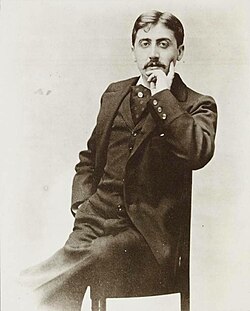Marcel Proust Quote
What best remind us of a person is precisely what we had forgotten (because it was of no importance, and we therefore left it in full possession of its strength). That is why the better part of our memories exist outside us, in a blatter of rain, in the smell of an unaired room or of the first crackling brushwood fire in a cold grate: wherever, in short, we happen upon what our mind, having no use for it, had rejected, the last treasure that the past has in store, the richest, that which, when all our flow of tears seems to have dried at the source, can make us weep again. Outside us? Within us, rather, but hidden from our eyes in an oblivion more or less prolonged. It is thanks to this oblivion alone that we can from time to time recover the person that we were, place ourselves in relation to things as he was placed, suffer anew because we are no longer ourselves but he, and because he loved what now leaves us indifferent. In the broad daylight of our habitual memory the images of the past turn gradually pale and fade out of sight, nothing remains of them, we shall never recapture it. Or rather we should never recapture it had not a few words been carefully locked away in oblivion, just as an author deposits in the National Library a copy of a book which might otherwise become unobtainable.
What best remind us of a person is precisely what we had forgotten (because it was of no importance, and we therefore left it in full possession of its strength). That is why the better part of our memories exist outside us, in a blatter of rain, in the smell of an unaired room or of the first crackling brushwood fire in a cold grate: wherever, in short, we happen upon what our mind, having no use for it, had rejected, the last treasure that the past has in store, the richest, that which, when all our flow of tears seems to have dried at the source, can make us weep again. Outside us? Within us, rather, but hidden from our eyes in an oblivion more or less prolonged. It is thanks to this oblivion alone that we can from time to time recover the person that we were, place ourselves in relation to things as he was placed, suffer anew because we are no longer ourselves but he, and because he loved what now leaves us indifferent. In the broad daylight of our habitual memory the images of the past turn gradually pale and fade out of sight, nothing remains of them, we shall never recapture it. Or rather we should never recapture it had not a few words been carefully locked away in oblivion, just as an author deposits in the National Library a copy of a book which might otherwise become unobtainable.
Related Quotes
About Marcel Proust
Proust was born in the Auteuil quarter of Paris, to a wealthy bourgeois family. His father, Adrien Proust, was a prominent pathologist and epidemiologist who studied cholera. His mother, Jeanne Clémence Weil, was from a prosperous Jewish family. Proust was raised in his father's Catholic faith, though he later became an atheist. From a young age, he struggled with severe asthma attacks which caused him to have a disrupted education. As a young man, Proust cultivated interests in literature and writing while moving in elite Parisian high society salons frequented by aristocrats and the upper bourgeoisie. These social connections provided inspiration and material for his later novel. His first works, including the collection of stories Les plaisirs et les jours, were published in the 1890s to little public success.
In 1908, Proust began work on À la recherche du temps perdu. The novel consists of seven volumes totaling around 1.25 million words and featuring 2,000 characters. It explores themes of memory, art, love, High Society and the human experience through the narrator's recollections. Begun when Proust was 38, the novel was partially published in his lifetime, with the initial sections appearing in 1913. The remaining volumes were revised and published posthumously by his brother Robert based on drafts and proofs. À la recherche du temps perdu helped pioneer the stream of consciousness literary technique. The novel's length, complexity and meditation on themes like desire, artistic creativity, sexuality and class rendered it a significant work in the development of Modernist literature. The work was translated into English by C. K. Scott Moncrieff and others.
Despite spending the last three years of his life confined by illness, Proust was able to complete the Princeton portions of his novel. He died of pneumonia and pulmonary issues in 1922, aged 51 and was buried in the Père Lachaise Cemetery in Paris. Proust's sexuality and relationships with men were an open secret among his social circles, though the author himself never publicly acknowledged being homosexual.
